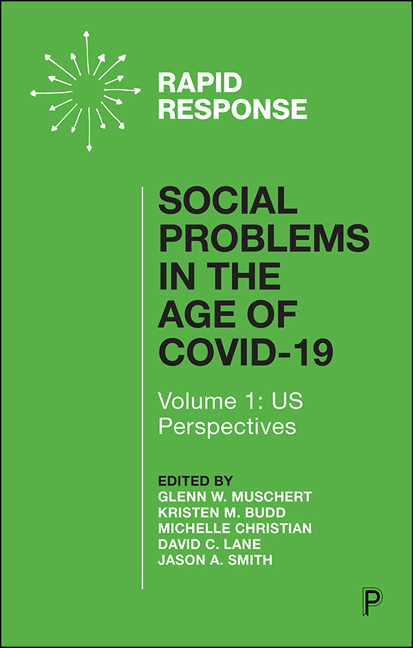13 - The Social Problems of COVID-19
Published online by Cambridge University Press: 23 March 2021
Summary
As the chapters in this volume reveal, the COVID-19 pandemic is related to a wide array of what are routinely described as social problems; they describe ways the disease makes many existing problems worse, even as it creates some new ones. These chapters focus narrowly on their various topics. This chapter adopts a broader perspective that seeks to synthesize sociologists’ thinking about the epidemic; it offers a theoretical framework for thinking about the many social problems of COVID-19.
Sociologists sometimes use the term social problems loosely, to refer to any aspects of anything considered harmful to society. In this paper, I am going to adopt a tighter definition—to focus on the processes by which people identify these troubling conditions. This approach is sometimes called constructionist because it explores how people construct social problems. (A classic statement of this approach is found in Malcolm Spector and John I. Kitsuse's 1977 book Constructing Social Problems.) This paper seeks to locate COVID-19 within a constructionist theoretical framework. It begins by classifying the principal types of COVID-19 social problems, and then examines the key stages in the process of constructing these problems.
But first, a disclaimer. I wrote this paper in late May 2020, only about four months after most Americans became aware that COVID-19 posed a serious threat, and about three after social distancing policies became widespread. Like all the other chapters in this volume, mine is an attempt to do sociology “on the fly.” It is too early to know all the ways our thinking about COVID-19 will evolve, let alone to have done thorough sociological research and analysis on the topic. Instead, this is a rough draft, an effort to guide thinking for future studies of the epidemic.
To begin, we need to appreciate that COVID-19 is not a single social problem. Rather, it involves a constellation of a great many interrelated topics that people consider social problems.
COVID-19 is of course the name for a coronavirus pandemic that originated in late 2019 and spread across most of the globe by early 2020. Think of this as COVID-19 the disease.
- Type
- Chapter
- Information
- Social Problems in the Age of COVID-19 Vol 1Volume 1: US Perspectives, pp. 134 - 142Publisher: Bristol University PressPrint publication year: 2020



